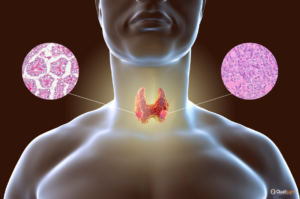Navigating Thyroid Cancer Treatments: Papillary vs. Follicular Subtypes
Thyroid cancer is a complicated disease that needs individualized treatment methods. There are two main types of differentiated thyroid cancer: papillary thyroid cancer (PTC) and follicular thyroid cancer (FTC). Recall that, in my last blog post, I explained what is meant by “differentiated” thyroid cancer. In this blog post, we will discuss the various treatment options for PTC and FTC. These options include surgery, radioactive iodine therapy (RAI), and thyroid hormone replacement therapy (THRT). There are some differences in how PTC and FTC are managed. By understanding treatment choices, patients can make well-informed decisions and manage their thyroid cancer effectively.
Papillary Thyroid Cancer (PTC)
PTC is the most common type of thyroid cancer and is known for its slow growth and generally favorable prognosis. The main treatment for PTC usually involves a combination of surgery, radioactive iodine therapy (RAI), and thyroid hormone replacement therapy (THRT).
- Surgery: The standard surgical procedure for PTC is called a total or near-total thyroidectomy. This involves removing the entire thyroid gland or most of it to eliminate the cancerous tissue and reduce the risk of recurrence.
- Radioactive Iodine Therapy (RAI): After surgery, RAI may be recommended to destroy any remaining thyroid tissue and detect potential metastases. Radioactive iodine is taken orally and specifically targets thyroid cells, including cancerous ones.
- Thyroid Hormone Replacement Therapy (THRT): Since the thyroid gland is removed during surgery, THRT is necessary to provide the body with the essential hormones it can no longer produce. This synthetic hormone replacement therapy helps maintain hormone balance and prevents hypothyroidism.
There are a number of subtypes of PTC (called “variants”). Expert pathologists can determine if there is a PTC variant based on the appearance of the cancer under the microscope. The variant of PTC can affect prognosis, which may affect treatment decisions. For a description of some of these PTC variants, click here.
Follicular Thyroid Cancer (FTC)
FTC is less common than PTC but requires a similar treatment approach. However, due to its potential to invade blood vessels and spread to distant sites, FTC may have some differences in management.
- Surgery: The primary treatment for FTC is typically a total thyroidectomy, similar to PTC. This surgery removes the entire thyroid gland to minimize the risk of recurrence and eliminate the source of cancerous follicular cells.
- Radioactive Iodine Therapy (RAI): Unlike PTC, RAI is not routinely used for FTC. Since FTC cells are less likely to concentrate iodine, the effectiveness of RAI in targeting residual or metastatic FTC cells is limited. However, RAI may still be considered in certain cases based on individual factors and cancer characteristics.
- Thyroid Hormone Replacement Therapy (THRT): As with PTC, THRT is essential after FTC surgery to ensure the body receives an adequate supply of thyroid hormones.
- Adjunct Therapies and Ongoing Monitoring: In addition to primary treatments, adjunct therapies may be recommended based on individual cases. These can include external beam radiation therapy (EBRT) for more advanced or aggressive cases, targeted therapies for recurrent or metastatic disease, or participation in clinical trials exploring new treatment options.
Ongoing monitoring is crucial in managing both PTC and FTC. Regular follow-up visits, blood tests to monitor thyroid hormone levels, and imaging studies such as ultrasounds and radioactive iodine scans help detect potential recurrence or metastasis. Adjustments to thyroid hormone replacement therapy dosage may be made to maintain optimal hormone levels.
In Conclusion
Effective management of thyroid cancer, whether it is the papillary or follicular subtype, requires a comprehensive and personalized approach. Understanding the different treatment options available for PTC and FTC empowers patients to actively participate in their healthcare decisions. Through surgical interventions, radioactive iodine therapy, thyroid hormone replacement therapy, and adjunct therapies, individuals with PTC and FTC can achieve favorable outcomes and lead fulfilling lives.


